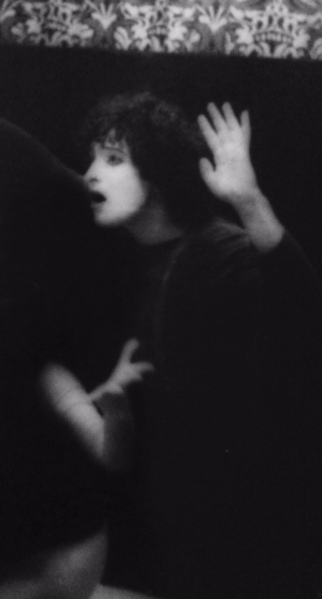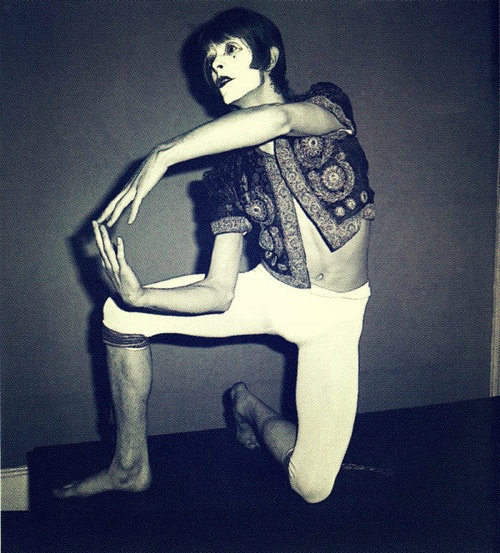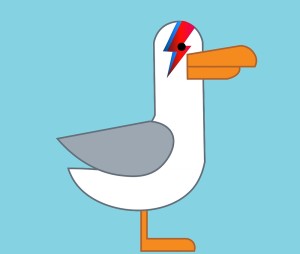I searched for form and land, for years & years I
roamed
When David Bowie died two years ago, the final corner of my holy-holy (rock) trinity of loss became complete.
In September 2016 I wrote that Bowie’s death was easier for me to accept than those of Freddie Mercury and Marc Bolan yet looking across the worlds of music and social media a year after Bowie went Blackstar, it is clear that despite my personal approach, the space he left behind is growing into a black hole and that his legacy will continue to grow larger and harder to define than that of almost any other deceased contemporary artist.
If as I wrote in my 2016 September and November Blogs, if it was Bolan who introduced me to the concept of posing to build self-confidence from the outside-in and Mercury who drew power from not being universally popular then it was Bowie who booted these and additional interpretations of individuality from behind the TV screen directly into his audience’s laps.
When in 1972 he sang ‘I had to phone someone so I picked on you’ I heard it as ‘I’m bringing you in, join me in the land of the different’.
Where Bowie quite quickly, after a 6 year journey to become an overnight success, stole a march on those who surrounded him was when:
A) He had a solid backlog of work that new fans could discover and
B) He had depth that went beyond the visuals and the melodies. The music was varied and the lyrics seemed deep and meaningful. The PR machine was straight into action in letting us know he borrowed writing techniques from the likes of William Burroughs and this soon added to Bowie’s mystique and credentials as an artist and not a ‘mere’ pop star.
Like many others, I bought into this lock and stock because at last there was somebody deep and clever which meant that by liking him I could somehow feel superior and therefore feel good about myself. At the time music seemed to be either rather soppy M.O.R such Elton John and as-yet-un-emerged Phil Collins or loud, clumsy and scruffy such as Black Sabbath and Deep Purple. Bowie introduced a thinking person’s mental middle ground that also touched differing musical styles all at once. To me, liking Bowie was obscure and made me feel interesting. It definitely made me feel that I was deeper than the sheep people who loved the so-after-the-event soggy Beatles. Most of all it meant there was an alternative to signing up to the pro-peasant unwashed culture of Rod Stewart and Slade. Of course there are many people that liked the acts that I didn’t who also liked Bowie and knowing this I want(ed) to demarcate myself from them and maintain my own private Bowie corner. I didn’t want to share Bowie with anyone else and what with all the grief out poured in January 2016, I felt the same again. Obviously none of us have any real possession over artists, but each of us has the prerogative to interpret and hold that interpretation and subsequent influences to one’s own heart.
Being a Bowie fan has been like being a cat person as opposed to a dog lover. Everything about him was subtle, shapeshifting and never obvious. Obtuse even. In 1976 he told The Sunday Times ‘anything you want me to be, I won’t be’. Whereas other performers were trained to be distinctive and clear, Bowie was never ‘in your face’. He embraced the force of obscurity (a calculated act of artifice?) and the more clever observers, many of whom were women like Kate Bush, Annie Lennox, and Madonna, successfully copied the notion that less is more.
Many commentators have described Bowie as a bridge. Visitors to the exhibition ‘Bowie Is’, which began in London in 2013 crisply linked Bowie to other areas of culture; particularly those of fashion.
The show also reminded us that he was a capable and un-cracked actor.
It was his interest in mime and body language that had a direct influence on me. Looking back I suppose I was struck by the contrast between silent mimes and rock music. His performance values had an inherent irony because on one hand the live music was loud, yet on the other he was able to overlay it with silent one-man theatrical vignettes that told tales of inner torture and angst. They matched the sonorous backdrop and denied it at the same time. The music was his, yet even while performing, he’d portray something else. Somehow the structure of his performances reflected the bipolarity and mental instability that haunted him.
As a direct consequence I spent several years learning and performing mime and joined and even lead various theatre groups. I performed on stage and learned how to react in front of an audience. I confronted and dealt with stage fright and how to deal with blunders. I worked out how to pause when the audience laughed and how to improvise if somebody forgot something (a word, a location…). All these are life skills that I wouldn’t have explored had it not been for Bowie.
Likewise, when I went to live in Zurich in 1976 and realised it was the birthplace of the Dada and Surrealist art movements, my internal bells rang because I had read about Bowie referencing them. I had no idea what these branches of modern art were, but because Bowie had mentioned them, they were good enough for me to explore. He taught me so much. He was a bridge and a compass. He set trends and added to language (e.g. Bowie’s the term ‘Space Invader’ from Moonage Daydream became an arcade video game in 1978).
In Alan Yentob’s brilliant 1975 documentary Cracked Actor, Bowie described himself as being like a fly in a carton of milk ‘just soaking it (America) up’. What he achieved was the ability to soak up snippets of data and by subsequently writing or talking about them he endowed them with a certain ‘cool’ simply because it was he that suggested an interest in them. If Bowie looked under a rock, the driest sand became interesting.
This was meaningful as a teenager because I was desperate to discover, I didn’t know quite what, but it certainly wasn’t anything within my school work. It was Bowie’s way of referencing so much (Kahlil Gibran, Orwell [1984]…) that gouged open several cans of intriguing worms (or as in the title above; le chien).
And this is why Bowie will super-endure the other two artists of my triumvirate and all the others that have been and gone. I accept, albeit grudgingly, that people will grasp hold of Lennon, Elvis, Jim Morrison and Janis Joplin and this is because each of these artists triggered a set of emo/psychological needs among individuals within their audience and it would be ignorant of me to claim my needs are any the greater. I confess that I do feel my pro-Bowie connections are more valid, but I do not think it.
So where are we now?
Recently I was in the Pompidou Centre in Malaga, Spain and was struck by this ceiling high exhibit.
As I stood below this rather unnerving 30 cm high ‘big head’ talking Bowie puppet, it was confirmed to me that he had successfully mashed himself into the world of legitimate art. Sure there have been tons of Rolling Stones and Elvis oriented art events over the years but this is beyond that. The artist, Tony Oursler had realised that an effigy of a talking head-of-Bowie (and this was created long before he died) suggested so many other dimensions than had it been Jagger, McCartney or Sinatra. I highlight ‘suggested’ because Bowie’s strength lies in what he pointed towards and what he hinted at rather than what he said. Whether it was about his own skating along the gender spectrum or complete opaqueness over the last 10 years as to whether he was a working person or a retired pensioner, he just knew how to play it.
I never met him but somewhere in my loft lies a photocopy of his passport that I sneaked from the files of a hotel I worked in three months after he was a guest there during the Station to Station tour.
His passport details were as you’d expect;
- Surname: Jones
- Middle name: Robert
- D.O.B: 8th January.
And as for occupation, the single word; musician.
That Bowie is an icon is not his issue. It’s impressionable people like me that allow some other people to become larger than life in our hearts & minds and in what influences us. It’s neither good, nor bad, it just is.
Bowie however was able to die knowing himself. Ultimately it suggests that despite all the insane stuff he name checked, he established self-knowledge and with that came peace of mind. As we embark on another January, I wish the same (sane) to you and, you guessed it; to myself.
‘Where can the horizon lie
When a nation hides
Its organic minds in a cellar…dark and grim
They must be very dim’





